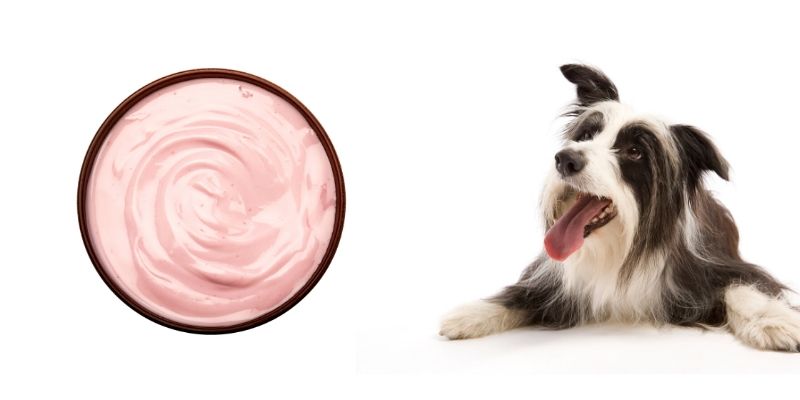While there’s no apparent “yogurt for dogs” on the market, this delicious dairy product may store some nutritional value for your dog, so it’s definitely worth looking into it as a supplement for pup’s menu.
Plain, non-fat yogurt gives probiotic benefits and works as an excellent source of calcium for dogs. So, adding a spoon of yogurt here and there can boost pup’s digestion and sometimes even keep your canine full for longer. But let’s dig deeper.
Are you interested in a particular topic about dogs and yogurts? Then use the table of contents below to jump to the most relevant section. And you can always go back by clicking on the black arrow in the right bottom corner of the page. Also, please note that some of the links in this article may be affiliate links. For more details, check the Disclosure section at the bottom of the page.
So can dogs have yogurt?
Although yogurt is not poisonous, your dog may have difficulty digesting it. Dogs’ bodies are not meant to digest lactose after puppyhood, and, accordingly, a lactose-containing food can provoke mild stomach problems, including gas and diarrhea.
If your pup shows any of these symptoms, be sure to have a chat with your vet. Another thing to be concerned about when talking about yogurts is its fat content. Fat diet can lead to pup’s stomach upset, or even pancreatitis.
I won’t go into the most in-depth details here, but in a nutshell, it’s a severe and potentially fatal illness, caused by inflammation of the pancreas, internal organ responsible for producing the enzymes essential for food digestion. When the pancreas is not functioning correctly, most of those enzymes start breaking down internal organs instead of breaking down the food. The body digests itself.

Therefore, always assure the yogurt holds no toxic or potentially dangerous ingredients to your dog: high fats, lot’s of sugar, xylitol, an artificial sweetener, which is toxic to dogs, etc.
And as with all new things introduced to pup’s diet, first, give your dog just a tiny amount to try and watch for his reaction. If he doesn’t show any unusual symptoms, it’s fine to give him yogurt once in a while.

Is yogurt good for dogs?
The brief answer is yes. Yogurt is a great source of zinc, calcium, probiotics, and other goodies.
It can help ease such gastrointestinal problems like diarrhea, inflamed bowels, or other digestive issues. It’s also a great source of protein, therefore, can create that lasting “full” feeling in your pup’s stomach.
The product is inexpensive and available in nearly any supermarket. Or you can simply make it yourself, which will be cheaper and way healthier, in the long run.

Is plain yogurt for ok for dogs?

Yes! In fact, anything but plain yogurt has additives that, those can be fine for humans (although sometimes it’s better avoid it too), are not so great for your dog. Regular plain yogurt is the best option ensuring that your pet receives the full nutritional benefits of the product. All things added in “coated” or “flavored” yogurt significantly decrease the nutritional value of the product and on the contrary, adds up some unhealthiness to your pup’s diet.
According to the database of United States Department of Agriculture (let’s hope that at least they got their facts straight) 100g of plain whole milk yogurt contains 61 calories, 3.47g of protein, 3.25g of fats, 4.66g of carbs and the long list of quite an amazing nutrients: Magnesium, Iron, Calcium, Phosphorus, Zinc, Potassium, Vitamins C, B, B6, B12, D, K, D2, D3 A and Folate.

Can dogs eat Greek yogurt?
The main thing that distinguishes the Greek yogurt from its traditional relative is a manufacturing process. Greek yogurt is strained to separate lactose and liquid whey, therefore it has more protein and less sugar, than regular yogurt, making it an even better alternative for canines. Especially if you care about pup’s lactose intolerance.
And it also loaded with a surprising amount of nutrients (even more than plain yogurt). As per database of United States Department of Agriculture 100 g of Greek yogurt has 73 calories, 9.95g of protein, 1.92g of fats, 3.94g of carbs and the endless list of nutrients: Magnesium, Iron, Calcium, Phosphorus, Zinc, Magnesium, Potassium, Thiamin, Niacin, Vitamins C, B, B6, B12, D, K, D2, D3, Riboflavin A and Folate. So, yeah, dogs definitely can give Greek yogurt a try.


What is the best dogs’ probiotics yogurt?
Prebiotics are indigestible sugars that can help to get rid of unhealthy bacteria in your pet’s tummy, replacing it with good bacteria as they act as food for the former. This is especially important if you have a pup that is a big fan of eating anything it gets its nose on including the insides of your trash can. In the long run, repopulating your pet’s body with all those good bacterias can help with digestion.
However, not all probiotics are formulated equal. Some may provoke diarrhea and make your pup gassy. So instead of feeding your dog more yogurt branded as “probiotic”, we’d suggest looking into a specially formulated probiotic supplement for dogs. Especially the one that comes in a form powder, so you can just sprinkle it over pups food (or yogurt, if you want).
Here are a couple of good options:
It boosts the growth of good bacteria for a healthy immune system and aids in your dog’s comfort by regulating digestion. This product is a blend of enzymes, probiotics, prebiotics, and vitamins. It seems to be especially helpful for dogs that are already stressed by medical conditions or the meds used to treat them. As some buyers reported using this supplement resulted in pup’s textbook perfect poop. And that’s a great result to strive for in this particular context 🙂 This product is available on Amazon, and you can check more reviews and the latest price .
Another suggestion is
It’s amongst the most recognizable and trusted pets probiotics products in the US, and it’s been that way for a good decade. The product designed to improve diarrhea, yeast issues, loose stool, bad breath, tear staining, body odor, poor digestion, and even naturally enhance the condition of pup’s skin and coat.
It has no fillers and contains the best variety and balance of “good bacteria” than any other product on the market as claimed by the manufacturer. This product also available on Amazon and you can check more reviews and the latest price .

What is the best yogurt for dogs of all?
The best kind of yogurt is plain or even non-fat plain. Just make sure it’s yogurt without chemicals or sweeteners. For lactose intolerant pups Greek yogurt would also be a better choice. But whatever you prefer always scan the label to identify any sketchy ingredients before you share any yogurt with your animal. Or maybe you’ll be better off preparing that yogurt yourself to make sure that it has only healthy ingredients (and to save money in the long run).
If you are looking into giving yogurt making a try a great inexpensive machine for the purpose. You can make your product sweet, plain, organic… Just put the ingredients in, push the button, wait for several hours, and enjoy your own super healthy and fresh yogurt.

How much yogurt can I give my dog?

From one to three tablespoons. The right serving size for dogs varies based on the kind of yogurt and your dog’s weight, size, regular daily calorie intake, and activity level. When you know your dog’s daily nutritional needs, you can determine how much yogurt your dog can have. Overall remember that 10% rule: yogurt should never be more than 10% of the calories your dog eats every day.

What’s the best way to feed your dog with yogurt?
You can just put a spoon of it on top of pet’s regular food, mix it in, or add yogurt as an ingredient of home-cooked dog meals. You can also freeze it and share an ice cube of yogurt with your pup as an occasional treat.

Yogurt for dogs. Summary
Yogurt is rich in healthy nutrients and acts as a probiotic, which can be beneficial for pup’s digestive system, so it can be quite a fantastic addition to a pet’s diet. But avoid flavored yogurts that are stuffed with chemicals and especially xylitol.
All and all before making yogurt a regular part of your dog’s diet, consult your veterinarian, and work out the proper serving size.
Thanks for the blog graphics: Canva.com


